This Redditor Neutered A Stranger's Cat So She Turned To Reddit For Advice After The Original Owner Threatened Her
We all know that our pets adore us, even if they sometimes don't act like it, and we love them even more than they could ever imagine. That's why it's one of the worst feelings to lose your pet, whether they pass away or simply run away and can't find their way back home; it's something we hope no pet owner has to endure.
It's important to be cautious with your pets and ensure that while they're enjoying their time in the outside world, they're doing so safely and can't run away from you, as this happens too often.
Your cat might decide to follow you to work or school one day, and if you don't handle it immediately, the cat can follow you for miles, leaving you uncertain about its safety.
This is especially true for younger pets that are unfamiliar with their surroundings and may struggle to find their way back home if they lose sight of you or familiar ground. This can happen to anyone, so it's crucial to prioritize safety with your pets because you never know what could occur.
This Reddit user turned to Reddit after the original owner of a cat that came to OP's house clawing at the door for entry because he had been attacked by a fox.
OP did everything she could to locate the cat's owners, but there was simply no way to do so because the cat didn't have a microchip and he wasn’t neutered.
The cat was fortunate that the door he scratched on belonged to a lady who has 17 cats, making it easy to say that it was a good home. OP had to neuter the cat because he was causing issues, and after two years, the original owners recognized their cat after OP posted a video on Facebook and confronted her.
Scroll down to get all the juicy details and see what advice the people of Reddit had for OP.
OP is a kind soul who dedicated her life to adopting from sanctuaries and providing them with adequate shelter, food, and water.
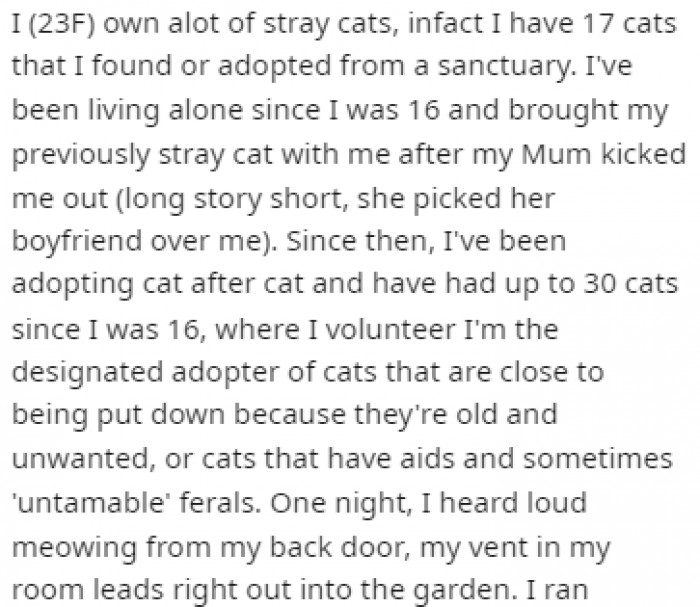
She saved the cat that was attacked by a fox, and she immediately took him to a vet and tried to locate his owners.
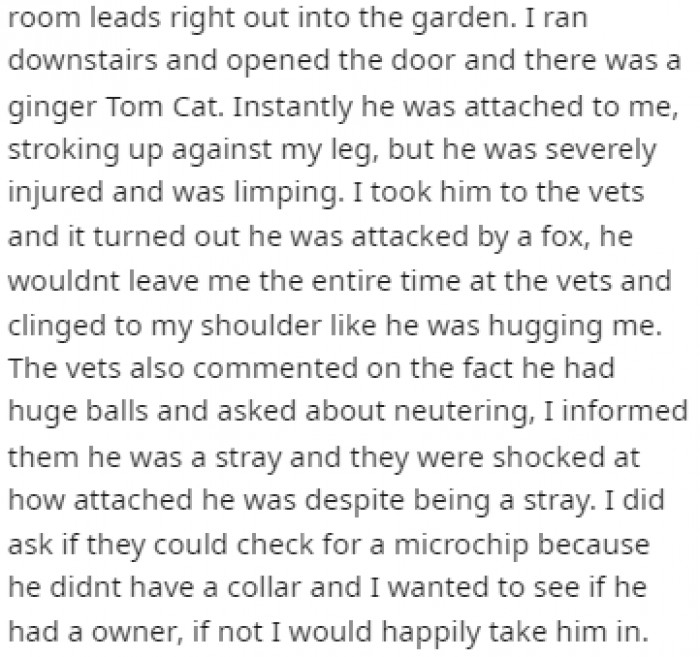
She put up posters and posted his pictures in Facebook groups to find the owners, but it didn't work. She had to neuter him because he was causing issues in the home.
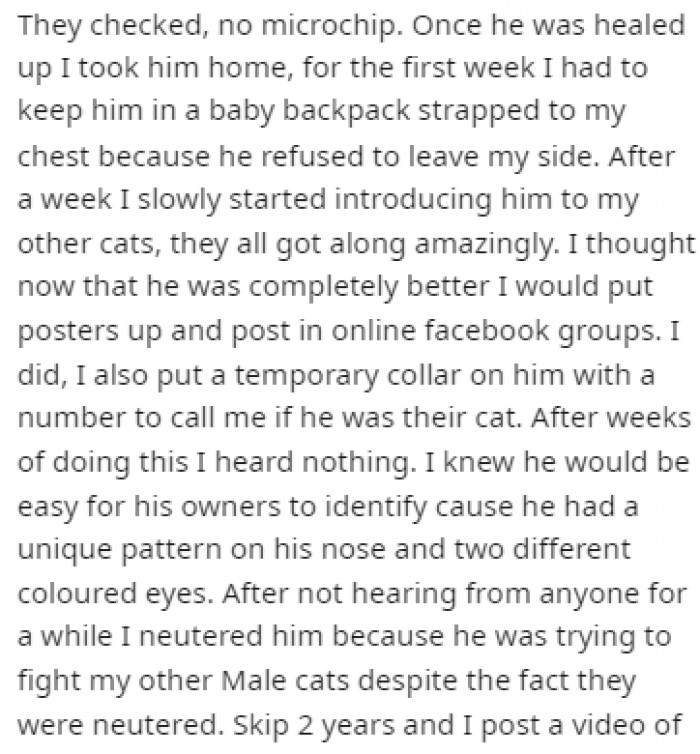
Ethics of Animal Care
The act of neutering a stranger's cat without consent raises significant ethical questions in the realm of animal care. Dr. Lydia Chen, an animal behaviorist, points out that while the intention to help the cat may have been noble, the lack of consent undermines the ethical responsibility pet owners have to communicate and collaborate with one another.
This situation reflects an important psychological principle known as 'moral reasoning,' where individuals must navigate the complexities of right and wrong in their actions. Understanding the psychological underpinnings of moral decision-making can help individuals better assess the consequences of their actions on others.
The Ethics of Animal Care and Responsibility
Dr. Rachel Simmons, an animal rights advocate and psychologist, emphasizes the ethical complexities involved in caring for animals, particularly when fostering or adopting pets. Ethical dilemmas often arise when considering the responsibilities of pet ownership, including the need for consent from original owners.
Research in animal ethics indicates that fostering should prioritize the best interests of the animal, which includes considering the potential consequences of actions taken without the owner's knowledge.
After a long two years, the owners turned up and demanded ownership of the cat.
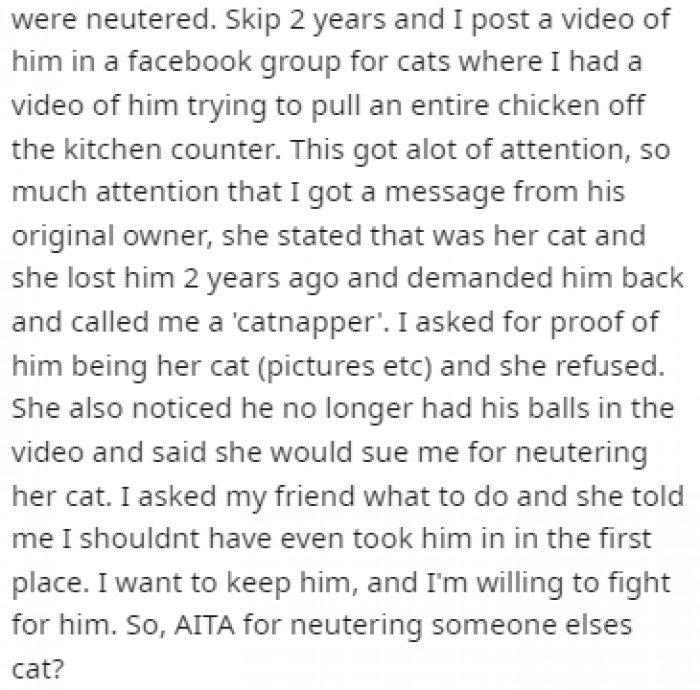
A Controversial Opinion
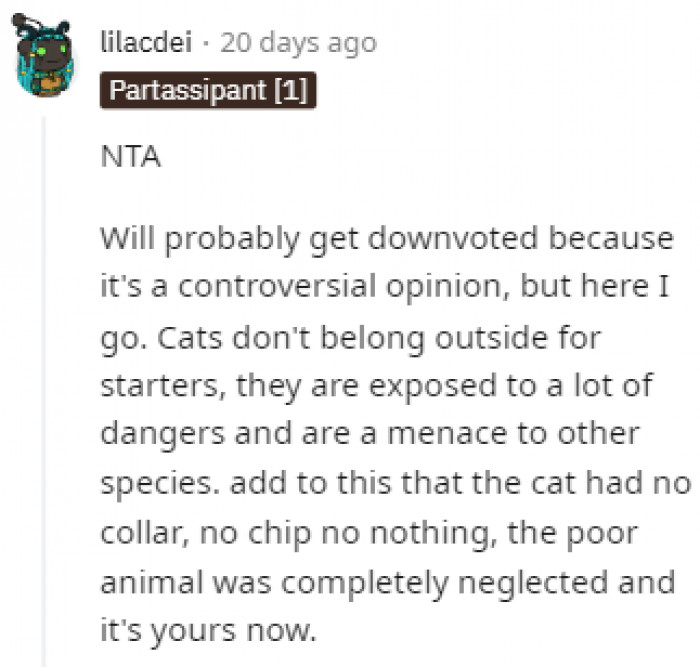
Two Years is a Long Time
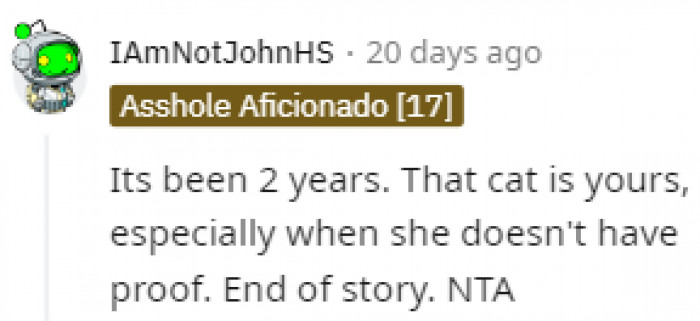
Furthermore, this incident touches on the concept of 'social norms,' which dictate acceptable behavior within a community. Research indicates that when individuals act outside of established social norms, they may face backlash or conflict, as seen with the original owner's reaction. A study published in the Journal of Social Psychology highlights that adherence to social norms is crucial for maintaining trust and cooperation within communities.
Understanding these dynamics can help individuals navigate similar situations with greater awareness of the potential social consequences of their actions.
A clinical psychologist specializing in attachment theory notes that the bond between pets and their owners can complicate situations such as this. When a pet is taken in without the original owner's consent, it can lead to feelings of betrayal and loss for the original owner.
Studies show that strong emotional attachments can evoke significant distress when disrupted, underscoring the importance of considering the emotional ramifications of such actions.
An Easy Answer
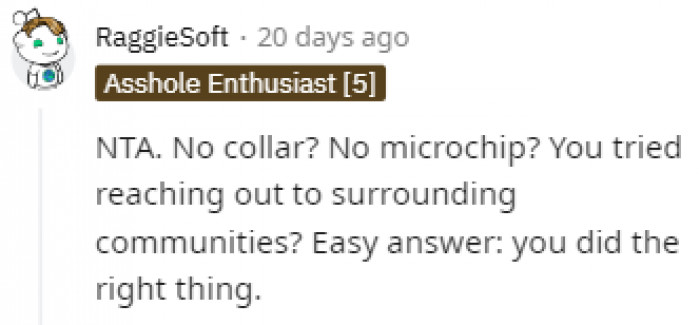
Seems Like an Irresponsible Owner
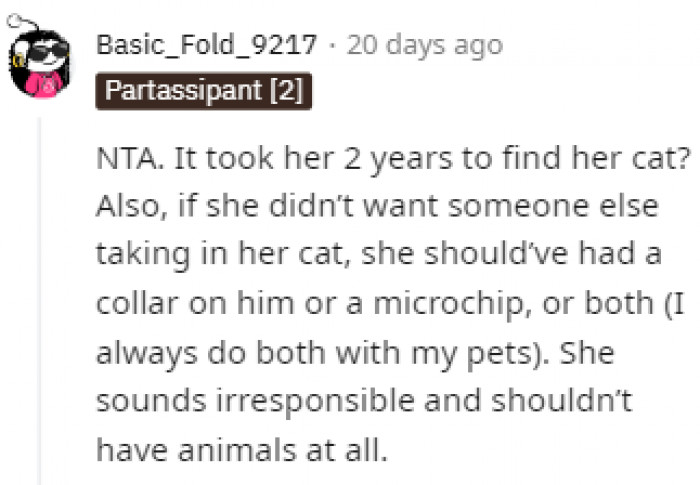
A Lot Was Invested in the Cat
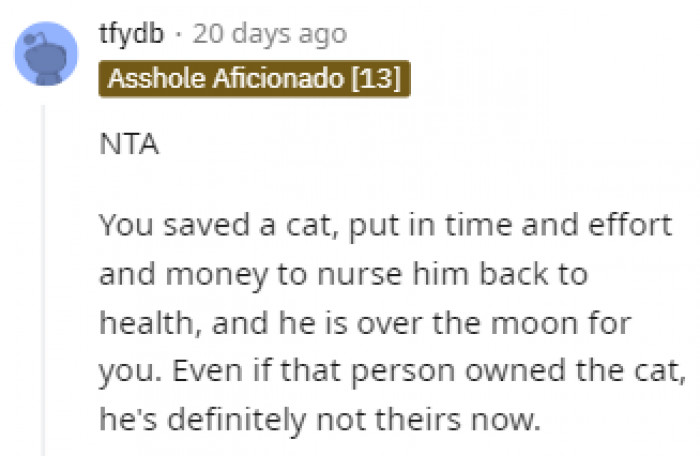
Impact of Communication on Relationships
Effective communication is key in any relationship, including those involving pet care. Dr. Karen Thompson, a communication expert, emphasizes that clear dialogue between pet owners is essential for establishing trust and mutual understanding.
When communication breaks down, misunderstandings can arise, leading to conflict and resentment. Research shows that active listening and open discussions can significantly improve interpersonal relationships, allowing for more collaborative problem-solving.
Understanding the Impact of Emotional Attachment
Research in social psychology suggests that the emotional bonds formed between pets and their owners are profound, often likened to familial relationships. This attachment can create intense reactions when the status quo is altered, as seen in this situation.
Understanding this dynamic is crucial for all parties involved, as it highlights the emotional stakes in matters of animal care and ownership.
Some People Didn't Look Past the First Sentence

After two years, the original owners showed up out of nowhere and demanded that OP return their cat to them. Do you think that the owners should still get their cat back, no matter how long it took them to find her, or do you believe that the cat has a new owner now and there's no reason to give her back?
Behavioral psychologists have found that disruptions in attachment can lead to heightened anxiety and feelings of loss. In this case, the original owner’s reaction illustrates how deeply held emotional attachments can trigger strong responses when threatened.
Being aware of these dynamics can help individuals navigate their feelings more effectively and approach the situation with empathy and understanding.
Psychological Analysis
This scenario illustrates the intricate nature of emotional attachments in pet ownership. It's essential to recognize the potential for conflict when these attachments are disrupted. Acknowledging the emotional stakes can lead to more compassionate approaches in resolving such dilemmas.
Analysis generated by AI
Analysis & Alternative Approaches
In summary, this situation brings to light the ethical and emotional complexities surrounding animal care. Understanding the emotional ramifications of actions taken without consent can foster healthier interactions and ultimately benefit the animals involved.
Behavioral specialists affirm that developing empathy and communication skills is essential in navigating these challenges effectively.
To prevent similar misunderstandings, fostering a culture of open dialogue among pet owners can be beneficial. Engaging in community workshops on effective communication skills can empower individuals to express their concerns and collaborate on animal care in a respectful manner.
Additionally, establishing clear agreements on responsibilities and expectations can help avoid conflicts and ensure that all parties feel heard and valued in the decision-making process.
Analysis & Alternative Approaches
In conclusion, the ethical implications of neutering a stranger's cat highlight the importance of communication and adherence to social norms in animal care. As research indicates, fostering open dialogue can significantly enhance relationships and prevent conflicts. Ultimately, understanding the psychological principles at play can lead to more ethical and responsible decision-making in the future.



